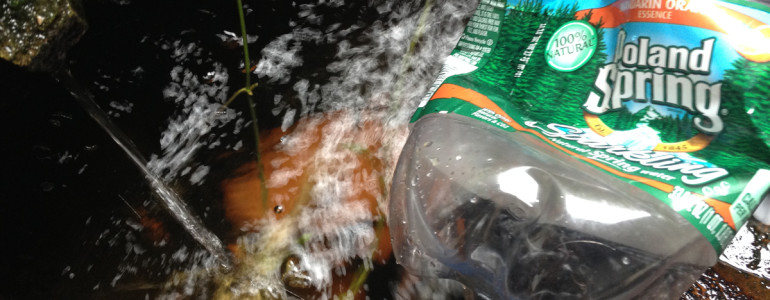Published Apr 15, 2014 By Nate Drag in Buffalo Rising.com
From the Pacific Ocean garbage patch to litter at our local parks, plastic pollution has become a major problem facing the environment. As the weather warms up and you step outside to visit your favorite park or walk down your street, you have probably witnessed first-hand the amount of plastics that end up in the environment.
Plastic pollution, from the common plastic bag (see here) to the tiny microbeads found in face wash (see here), is impacting the water quality of the Great Lakes and its inhabitants.
What exactly happens when these plastics end in up in the largest surface freshwater system in the world? And what about the plastics you don’t see when you visit the Lakes? Learn the answers to these questions in a webinar hosted by the Alliance for the Great Lakes on April 29th at 1:00 pm which will feature innovative research being done across the Great Lakes on plastic pollution.
Right here on Lake Erie, Dr. Sherri A. Mason, Associate Professor in the Department of Chemistry and Biochemistry at SUNY Fredonia, has led the first-ever survey for plastic pollution within the open waters of the Great Lakes.
Her research has found high concentrations of tiny plastic particles in the lakes, including microbeads from personal care products. These “microplastics” may absorb toxins that threaten fish and other wildlife. And over on Lake Michigan, Dr. Timothy Hoellein, Assistant Professor in the Department of Biology at Loyola University Chicago, has been analyzed the type and amount of trash collected by Adopt-a-Beach™ volunteers at five beaches in four states.
His data looks at where litter comes from and how it can inform strategies to keep plastics and other trash out the Great Lakes. Both of these researchers will be presenting the findings on a live webinar on Tuesday, April 29, at 1 pm Eastern Time. Please visit www.greatlakesevents.webex.com for more information on this webinar.
But what if you already know the challenges these plastics pose and are ready to take action? Each year volunteers across the Great Lakes participate in marine debris collection and beach health assessments to not only collect plastic but track where and what debris they are finding.
Long standing seasonal events like the Buffalo Niagara Riverkeeper Shoreline Sweeps (coming up on April 26th) and the Great Lakes Beach Sweep (September 20th) have engaged citizens for years but if you would like to help gather marine debris and data throughout the year, the Alliance for the Great Lakes will be hosting an Introductory Training in the Adopt-a-Beach™ program on April 16th at 6:00 pm Woodlawn Beach.
Adopt-a-Beach™ is a year round program where volunteers visit their favorite Great Lakes beaches and shorelines to conduct litter collection and monitoring and perform a citizen science beach health assessment. The data they gather is then entered into an online database for analysis and shared with beach health officials.
With marine debris, plastic pollution, and poor water quality as major issues facing Great Lakes ecosystems and habitats, Adopt-a-Beach™ offers citizens an opportunity to take an active role in finding solutions to these problem throughout the year. Volunteers come out in groups of all sizes from individuals to school groups to business and community organizations. For more information, please visit www.greatlakesadopt.org.
Research and citizen action like this can make a difference. As we have seen with the proposed legislation on banning the use of microbeads, change can happen. Learn more about this issue and how you can become a part of that change by joining the webinar on the 29th or an Adopt-a-Beach training!
Nate Drag, New York Outreach Coordinator, Alliance for the Great Lakes, ndrag@greatlakes.org, 716-261-9393.

No comments:
Post a Comment
Note: Only a member of this blog may post a comment.